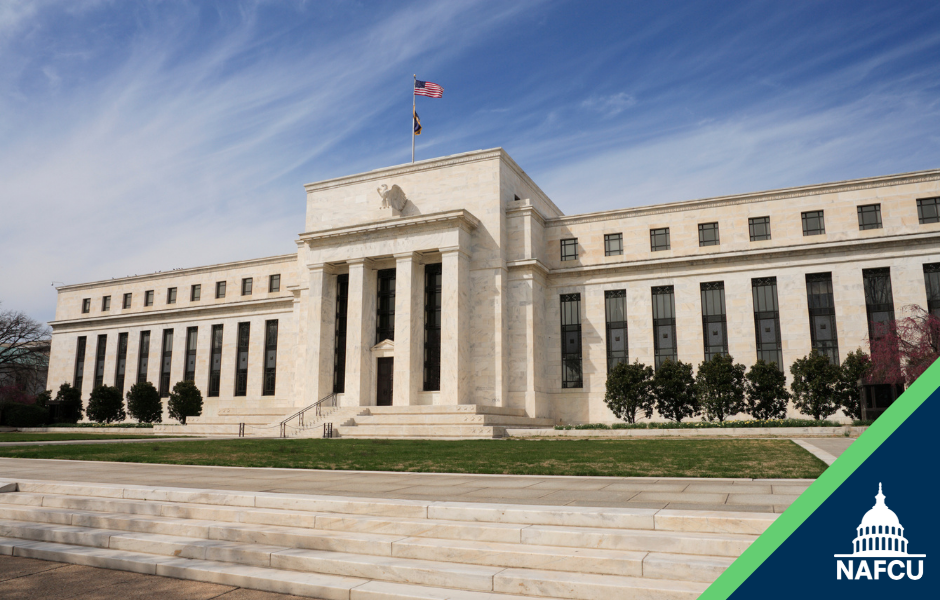Newsroom
Fed: Mismanagement, insufficient supervision led to SVB collapse
 Federal Reserve Vice Chair for Supervision Michael Barr released findings from the Fed’s review of Silicon Valley Bank’s (SVB) failure. In response to the insights, Barr said the Fed needs to strengthen its supervision and regulation as he attributed regulatory relief and supervisory changes enacted under the Economic Growth, Regulatory Relief, and Consumer Protection Act (S. 2155) as a factor in the collapse.
Federal Reserve Vice Chair for Supervision Michael Barr released findings from the Fed’s review of Silicon Valley Bank’s (SVB) failure. In response to the insights, Barr said the Fed needs to strengthen its supervision and regulation as he attributed regulatory relief and supervisory changes enacted under the Economic Growth, Regulatory Relief, and Consumer Protection Act (S. 2155) as a factor in the collapse.
The report noted at the time of its failure, SVB had 31 unaddressed safe and soundness supervisory warnings – triple the average number of peer banks.
The report identified four main factors:
- SVB’s board of directors and management failed to manage their risks;
- Federal Reserve supervisors did not fully appreciate the extent of the vulnerabilities as SVB grew in size and complexity;
- supervisors did not take sufficient steps when vulnerabilities were identified to ensure that SVB fixed those problems quickly enough; and
- the Fed’s tailoring approach in response to S. 2155 and a shift in the stance of supervisory policy impeded effective supervision by reducing standards, increasing complexity, and promoting a less assertive supervisory approach.
The report noted the Fed has begun to take some steps to address the findings, including conducting a holistic review of the financial system’s capital framework, implementation of the Basel III endgame rules, the use of multiple scenarios in stress testing, and a long-term debt rule to improve the resiliency and resolvability of large banks. The Fed will seek comments on any proposals and will consider taking other steps as needed.
The Government Accountability Office (GAO) also released a report looking at the SVB and Signature Bank failures, noting risky business strategies, weak risk management practices, and weak liquidity as factors. GAO highlighted it has called on regulators to consider noncapital triggers to their framework for prompt corrective action since 2011 and recommended examiners escalate concerns about deteriorating conditions more quickly.
Of note, the Senate Banking Committee holds a hearing Thursday to discuss holding executives accountable after the bank failures.
In the wake of the bank failures, NAFCU worked to distinguish credit unions as safe, secure, and reliable financial institutions. NAFCU President and CEO Dan Berger joined Bloomberg TV, as well as other outlets, to discuss the “flight to safety” at credit unions and has a recent op-ed further detailing the credit union difference.
Share This
Related Resources
Add to Calendar 2024-06-26 14:00:00 2024-06-26 14:00:00 Gallagher Executive Compensation and Benefits Survey About the Webinar The webinar will share trends in executive pay increases, annual bonuses, and nonqualified benefit plans. Learn how to use the data charts as well as make this data actionable in order to improve your retention strategy. You’ll hear directly from the survey project manager on how to maximize the data points to gain a competitive edge in the market. Key findings on: Total compensation by asset size Nonqualified benefit plans Bonus targets and metrics Prerequisites Demographics Board expenses Watch On-Demand Web NAFCU digital@nafcu.org America/New_York public
Gallagher Executive Compensation and Benefits Survey
preferred partner
Gallagher
Webinar
Add to Calendar 2024-06-21 09:00:00 2024-06-21 09:00:00 2024 Mid-Year Fraud Review Listen On: Key Takeaways: [01:16] Check fraud continues to be rampant across the country. Card fraud is affecting everyone. [04:31] Counterfeit US passport cards are just another new toolbox in the bad actors’ toolbox. [07:21] Blocking the fallback is the only way to defeat counterfeit cards. [11:17] The best way is constant education to your members in as many channels as you can. [13:02] We are still seeing overdraft lawsuits. Make sure the programming you have at your credit union matches what you have displayed for the members. Web NAFCU digital@nafcu.org America/New_York public
2024 Mid-Year Fraud Review
Strategy & Growth, Consumer Lending
preferred partner
Allied Solutions
Podcast
Add to Calendar 2024-06-21 09:00:00 2024-06-21 09:00:00 The Evolving Role of the CISO in Credit Unions Listen On: Key Takeaways: [01:30] Being able to properly implement risk management decisions, especially in the cyber age we live in, is incredibly important so CISOs have a lot of challenges here. [02:27] Having a leader who can really communicate cyber risks and understand how ready that institution is to deal with cyber events is incredibly important. [05:36] We need to be talking about risk openly. We need to be documenting and really understanding what remediating risk looks like and how you do that strategically. [16:38] Governance, risk, compliance, and adherence to regulatory controls are all being looked at much more closely. You are also seeing other technology that is coming into the fold directly responsible for helping CISOs navigate those waters. [18:28] The reaction from the governing bodies is directly related to the needs of the position. They’re trying to help make sure that we are positioned in a way that gets us the most possibility of success, maturing our postures and protecting the institutions. Web NAFCU digital@nafcu.org America/New_York public
The Evolving Role of the CISO in Credit Unions
preferred partner
DefenseStorm
Podcast
Get daily updates.
Subscribe to NAFCU today.
